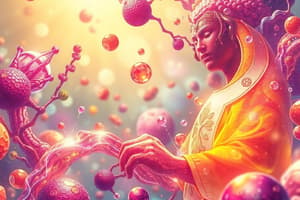Podcast
Questions and Answers
Carbohydrates are polyhydroxyaldehyde or polyhydroxyketone with the Empirical formula Cn(H2O)n.
Carbohydrates are polyhydroxyaldehyde or polyhydroxyketone with the Empirical formula Cn(H2O)n.
True
Monosaccharides can be classified as triose, tetrose, pentose, or hexose based on the number of carbons.
Monosaccharides can be classified as triose, tetrose, pentose, or hexose based on the number of carbons.
True
Disaccharides consist of three monosaccharides covalently linked by glycosidic bonds.
Disaccharides consist of three monosaccharides covalently linked by glycosidic bonds.
False
Carbohydrates serve as a structural component of many organisms, including the exoskeleton of many insects and the fibrous cellulose of plants.
Carbohydrates serve as a structural component of many organisms, including the exoskeleton of many insects and the fibrous cellulose of plants.
Signup and view all the answers
Polysaccharides are polymers consisting of chains of monosaccharide or disaccharide units.
Polysaccharides are polymers consisting of chains of monosaccharide or disaccharide units.
Signup and view all the answers
Oligosaccharides consist of a few monosaccharides covalently linked by glycosidic bonds.
Oligosaccharides consist of a few monosaccharides covalently linked by glycosidic bonds.
Signup and view all the answers
Monosaccharides can be classified as aldoses or ketoses based on the presence of an aldehyde or ketone group in the molecule.
Monosaccharides can be classified as aldoses or ketoses based on the presence of an aldehyde or ketone group in the molecule.
Signup and view all the answers
The aldehyde group is present at one end of aldoses, whereas the ketone group is present in the middle of ketoses.
The aldehyde group is present at one end of aldoses, whereas the ketone group is present in the middle of ketoses.
Signup and view all the answers
Carbohydrates do not serve as a cell membrane component.
Carbohydrates do not serve as a cell membrane component.
Signup and view all the answers
Tetrose is a type of monosaccharide with four carbon atoms.
Tetrose is a type of monosaccharide with four carbon atoms.
Signup and view all the answers
Study Notes
Carbohydrate Structure
- Carbohydrates have the empirical formula Cn(H2O)n.
- They can be classified as polyhydroxyaldehyde or polyhydroxyketone.
Monosaccharides
- Classified as triose, tetrose, pentose, or hexose based on the number of carbons.
- Tetrose is a type of monosaccharide with four carbon atoms.
- Can be classified as aldoses or ketoses based on the presence of an aldehyde or ketone group.
- In aldoses, the aldehyde group is present at one end of the molecule.
- In ketoses, the ketone group is present in the middle of the molecule.
Disaccharides and Polysaccharides
- Disaccharides consist of three monosaccharides covalently linked by glycosidic bonds.
- Polysaccharides are polymers consisting of chains of monosaccharide or disaccharide units.
- Oligosaccharides consist of a few monosaccharides covalently linked by glycosidic bonds.
Carbohydrate Function
- Carbohydrates serve as a structural component of many organisms.
- They are found in the exoskeleton of many insects and the fibrous cellulose of plants.
- They do not serve as a cell membrane component.
Studying That Suits You
Use AI to generate personalized quizzes and flashcards to suit your learning preferences.
Description
Test your knowledge of the biochemistry of carbohydrates with this quiz covering monosaccharides, disaccharides, and the empirical formula of carbohydrates. Learn about the different types of simple sugars and their chemical composition.




